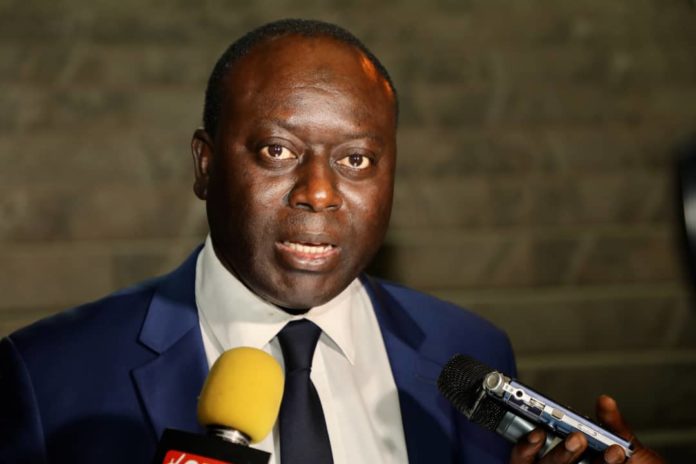By: Kebba AF Touray
The Gambian Lawmakers have welcomed the move taken by the Information Ministry to amend the Communication and Information Act. They made this expression on Monday 30th of November 2020, during the debate on the bill entitled Information and Communication (Amendment) Bill 2020, tabled before them by the Information Minister for adoption.
Ousman Sillah, member for Banjul North said: “The Information and Communication (Amendment) Bill 2020, is a progressive document, in view of the steps taken in the past to stifle the operations of the media.” The Bill, he said, seeks to ensure that the rights of the media are protected as provided for by section 25 of the Constitution”.
Sulayman Saho, member for Central Badibu said the bill is very significant and particularly when one looks at the objects and reasons of some of the clauses that are proposed to be repealed and amended as draconian, particularly section 173(A). he said in the past journalists suffered a lot in the country and were denied their fundamental rights, which are enshrined in section 25 subsection (1) paragraph (a) of the Constitution.
He said: “Information is the food of the mind, so if you limit information to the people, then that society cannot be recognized as a progressive society.”
He also said: “We must all be vigilant to ensure that the ill-treatment meted out on journalists in the past is not repeated in this country”.
He said: “Journalists must also be responsible in their work and report facts, adding that the dignity of human beings should be safeguarded because we are born with these rights and dignities and they cannot be taken from us and the bill seeks to protect these rights”.
Madi Ceesay member for Serrekunda West said: “The media has suffered dearly during the past regime and that the coming of the bill is quite welcoming. However journalists should also not use this to go outside the laws because laws are there to be respected and we assume that journalists would do their job with professionalism and be objective in giving information to the people”.
Halifa Sallah, Member for Serrekunda said we should not deem that when we talk about freedom of expression we are just talking about journalists, adding that section 25 of the Constitution provides for freedom of expression to be enjoyed by all. But there is also freedom of the media which is also enjoyed by all so the establishment of a media institution, provides the basis for the amplification of the voice of the people.
He added: “So it becomes a profession and that is why the Constitution in section 207 states that freedom of expression can also be transformed into a profession where one would be able to publish or transmit electronically what is truth and do so in good faith and in public interest”.
Sallah stressed further: “So essentially that requires some form of training for the person to be able to conduct that job because you are helping the society to acquire information that it relies on to make inform choices. The issue of surveillance is the conduct of an executive agency that should respect rights of the people:.
He said: “So that is legitimizing the work of an executive agency and therefore really negates the basis of section 17 of the constitution which states very clearly that rights shall be enforceable by the courts. So the court must not be transformed into an administrative institution. That provision needs to be effectively scrutinized by any committee of the national assembly that is to subject this bill to scrutiny”.
Earlier Ebrima Sillah, the Information Minister, told lawmakers that the Bill which seeks to create the enabling environment, for freedom of expression and media development in the Gambia, was formulated through an exhaustive consultative process, where a media law reform committee, was set up by his Ministry, in collaboration with Article 19 and the Ministry of Justice in 2018.
“ This committee which comprise a diverse group from the various media houses,, was tasked to review among others the media and communication law in the Gambia and to make recommendations for amendment or repeal of some of those problematic or draconian media laws, that impede growth in the sector and continue to endanger freedom of expression and freedom of the media,” he explained.
He said the committee during the review process, made reference to provisions of the Constitution of the Gambia, 1997 and its relevant provisions for freedom of expression and the media, the IC Act 2009, international and national treaties, the Gambia Press Union Legal Petition Paper on Media Reform in the Gambia, Article 19 legal reviews on the Gambia 2012 and 2017 and the European Union Data Protection Regulations.
He said in concluding its assignment, the media law reform committee recommended the amendment of the sections of the IC Act 2009, as amended in 2013 which this bill seeks to amend as follows:
A total repeal of section 173(A), to conform to Supreme Court decision of 9th May 2018, when the Gambia Press Union took the Gambia Government to court and won in the case; adding a new section 138(A) subjecting investigation into personal data decisions to judicial oversight and to establish criterion on data interception; section 65 to be limited to information communication technology tools and services and sections 232, 235and 236 to be subjected to prior judicial or parliamentary oversight of the powers.
Sillah said: “This bill if amended as proposed, will further strengthen our new found democracy in the Gambia, as it will support the domestication of international laws, by repealing from ICT Act from 2009 as amended in 2013, provisions that are inconsistent with international standards, thereby enhancing the Gambia’s conformity to international standards, treaties, conventions to which the Gambia is signatory to”.
He explicated that these include Article 9 of the African Charter on the Human and Peoples Rights, Article 66(c) and (d) of the ECOWAS Treaty and Article 19 of International Covenant on Civil and Political Rights. In addition it will demonstrate the Gambia Government’s commitment to promoting respect for the rule of law, with rights and fundamental freedoms, by creating a favorable environment, for the media to operate freely, but also responsibly.
He remarked: “This is premised on government’s recognition of the right to freedom of expression as a fundamental human right which is key to the protection of all other human rights and necessary to maintain the fundamental dignity of all human beings
He said it is important to note that the bill is not intended to encourage misconduct for any individual or entity within the media fraternity, but rather it provides adequate checks and procedures for enhanced professional media practice in the Gambia in an environment that will engender mutual trust between the journalists and the government. If the bill is passed, it will be another bold step by the Government of the Gambia to remove from our statute books.
He said: “The government of the Gambia will continue to work with the Gambia Press Union, to uphold all the principles of ethical journalism, fairness and professionalism of the media as highlighted in the constitution”.
The bill was referred to the Assembly Business Committee for committal.





















